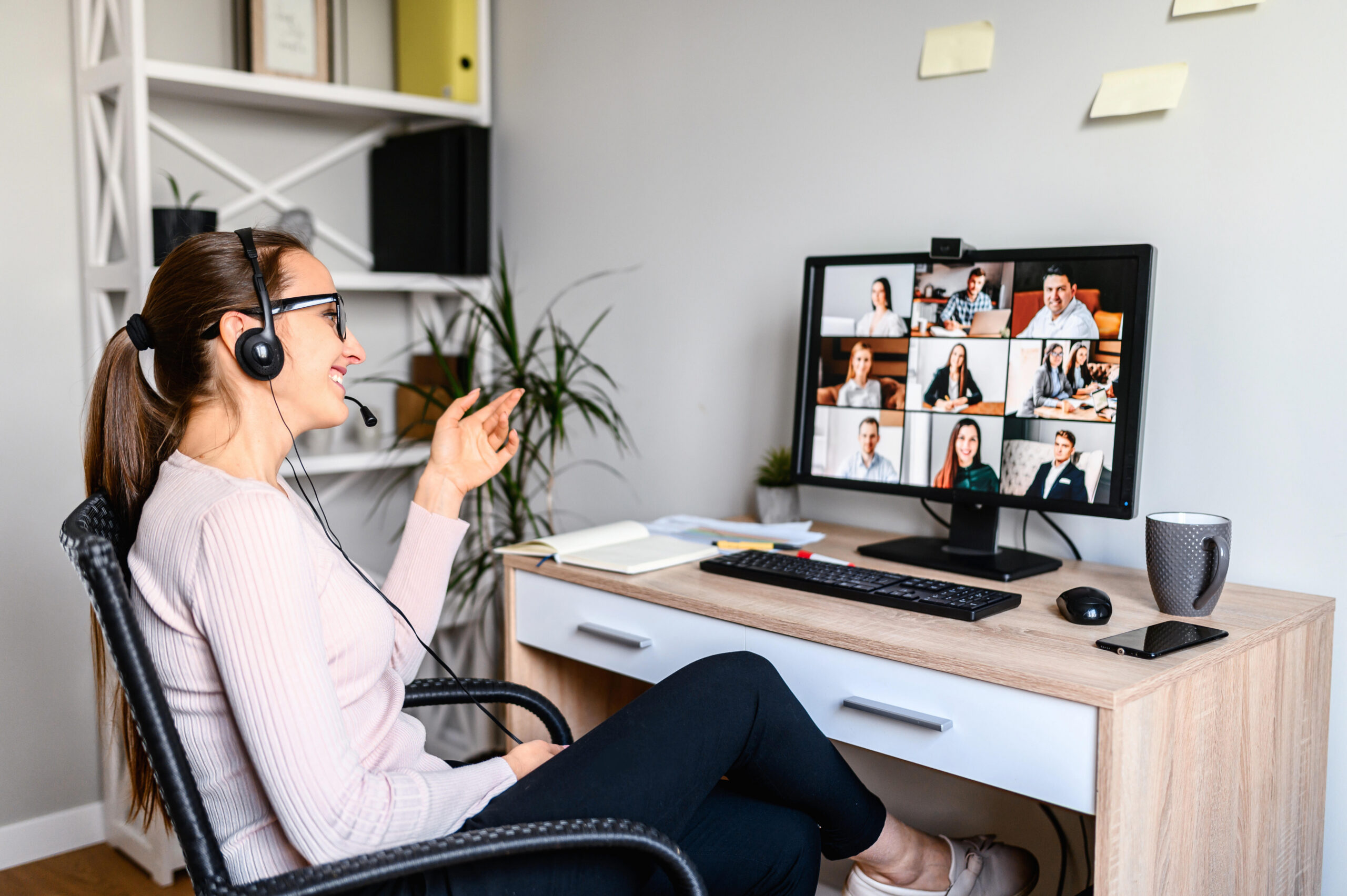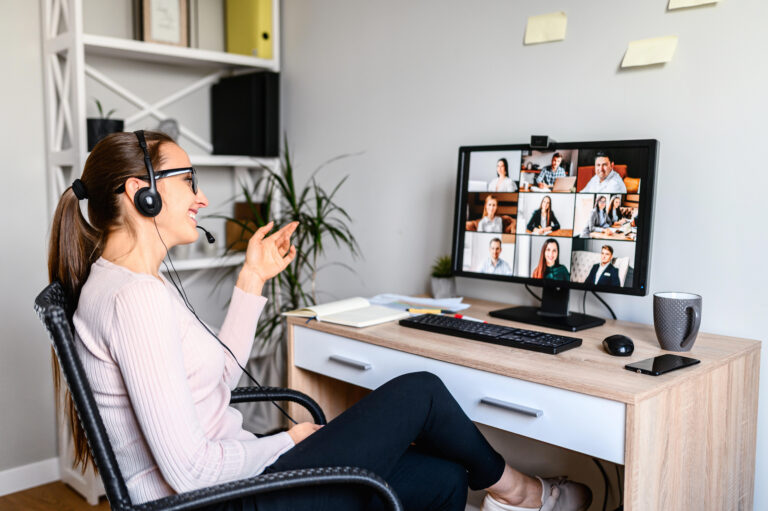Virtual job interviews have become the norm in today’s job market, and they require a different approach than traditional in-person interviews. Although the core purpose is the same—convincing an employer that you’re the best fit for the job—the way you present yourself, your surroundings, and your answers can make all the difference in a virtual setting. Discover how to ace your virtual interview by preparing effectively, setting up the right environment, and using body language to your advantage.

Prepare Your Technology
Before the interview, make sure all your technology is functioning properly. This includes your computer, webcam, microphone, and internet connection. It’s a good idea to test everything the day before, and again about 30 minutes before your interview. Use a reliable video conferencing platform like Zoom, Microsoft Teams, or Google Meet, and ensure that you have the latest version installed.
Have a backup plan in case of technical difficulties. Keep the interviewer’s contact information handy, so you can quickly reach out if anything goes wrong. It’s also smart to have a backup device, like your smartphone, ready to go just in case.
Set Up the Right Environment
Your environment says a lot about you, even in a virtual setting. Choose a quiet, well-lit space with minimal distractions. The background should be clean and professional—avoid clutter or personal items that could be distracting to the interviewer. If you’re unable to find a neutral background, most video platforms allow you to use a virtual one, but keep it simple and professional.
Good lighting is essential. Natural light is best, but if you don’t have access to it, position a lamp in front of you to ensure your face is well-lit. Avoid sitting with a window behind you, as this can cast shadows and make it difficult for the interviewer to see you clearly.
Dress for Success
Even though you’re interviewing from home, you should still dress as if you were attending an in-person interview. A professional appearance signals that you’re taking the interview seriously. Wear a business casual or formal outfit, depending on the industry, and avoid overly bright or patterned clothing that could be distracting on camera. Dressing the part can also boost your confidence and help you get into the right mindset for the interview.
Make sure your outfit is appropriate from head to toe, not just from the waist up. There’s always the possibility that you may need to stand up or adjust something on camera, and you don’t want to risk showing your casual, off-camera attire.
Use Effective Body Language
Body language plays a crucial role in virtual interviews, just as it does in person. Since the interviewer can only see you from the chest up, you need to be mindful of how you present yourself on camera. Sit up straight, keep your hands in view, and maintain a friendly but professional demeanor. Smiling and nodding occasionally show that you’re engaged and attentive.
Eye contact is just as important in a virtual interview as it is in person. Instead of looking at your screen, try to look directly into your webcam when speaking. This creates the impression of direct eye contact, which helps build rapport and shows confidence. If you’re tempted to look at yourself on the screen, consider hiding your video preview to stay focused on the interviewer.
Control Your Nerves
Virtual interviews can feel more stressful because of the unfamiliar format, but there are ways to manage your nerves. One of the best techniques is to practice deep breathing before the interview to calm your mind and body. Taking slow, deep breaths can reduce anxiety and help you stay focused.
Another effective strategy is to rehearse with a friend or family member. Simulate the interview environment by setting up your technology, sitting in your interview space, and answering common questions. This practice run can ease your nerves and help you feel more confident on the actual day.
Prepare for Common Virtual Interview Questions
Many virtual interviews follow a similar structure to in-person ones, but there are often specific questions related to remote work and virtual collaboration. Be ready to answer these along with standard interview questions about your skills and experience. Some common virtual interview questions include:
- “How do you stay productive while working from home?”
- “What tools do you use to collaborate with remote teams?”
- “How do you handle distractions while working remotely?”
For standard questions like “Tell me about yourself” or “Why do you want this job?”, have concise, well-prepared answers that highlight your experience and enthusiasm. Tailor your responses to reflect the skills and qualities relevant to the job, and make sure you mention how you can contribute to the company in a remote or hybrid work environment.
Showcase Your Adaptability
Employers want to know that you can adapt to virtual work environments, especially if remote work is part of the role. Use your interview to showcase your flexibility and problem-solving skills. For example, you might discuss how you adapted to remote work during the pandemic or share specific examples of times when you had to quickly adjust to new technology or processes.
If you’ve worked in a remote capacity before, highlight the tools you’ve used, such as project management software like Asana or communication platforms like Slack. Demonstrating your comfort with virtual tools and workflows shows that you’re ready to hit the ground running in a remote role.
Avoid Over-Talking
It’s easy to accidentally interrupt someone or talk over them during virtual interviews because of slight audio delays. To avoid this, practice pausing for a second after the interviewer finishes speaking. This ensures they’re done with their thought before you begin answering.
It’s also important to keep your responses clear and concise. Long-winded answers can come across as rambling, especially over video. Aim to answer questions within 1-2 minutes, focusing on key points and examples that demonstrate your qualifications.
Have Questions Ready
At the end of most interviews, the interviewer will ask if you have any questions for them. This is your opportunity to learn more about the company and show that you’re genuinely interested in the role. Prepare a few thoughtful questions in advance, such as:
- “How does the team stay connected while working remotely?”
- “What challenges has the company faced with virtual collaboration, and how have they been addressed?”
- “How do you support professional development for remote employees?”
These questions not only demonstrate your interest in the job but also provide valuable insight into the company’s culture and remote work policies.
The Bottom Line
Acing a virtual job interview requires thoughtful preparation, from setting up your environment and testing your technology to using body language effectively and rehearsing common questions. By focusing on both the technical and interpersonal aspects of the interview, you can make a lasting impression and increase your chances of landing the job. Show that you’re adaptable, confident, and ready to succeed in a remote or hybrid work environment, and you’ll be well on your way to securing your next opportunity.












